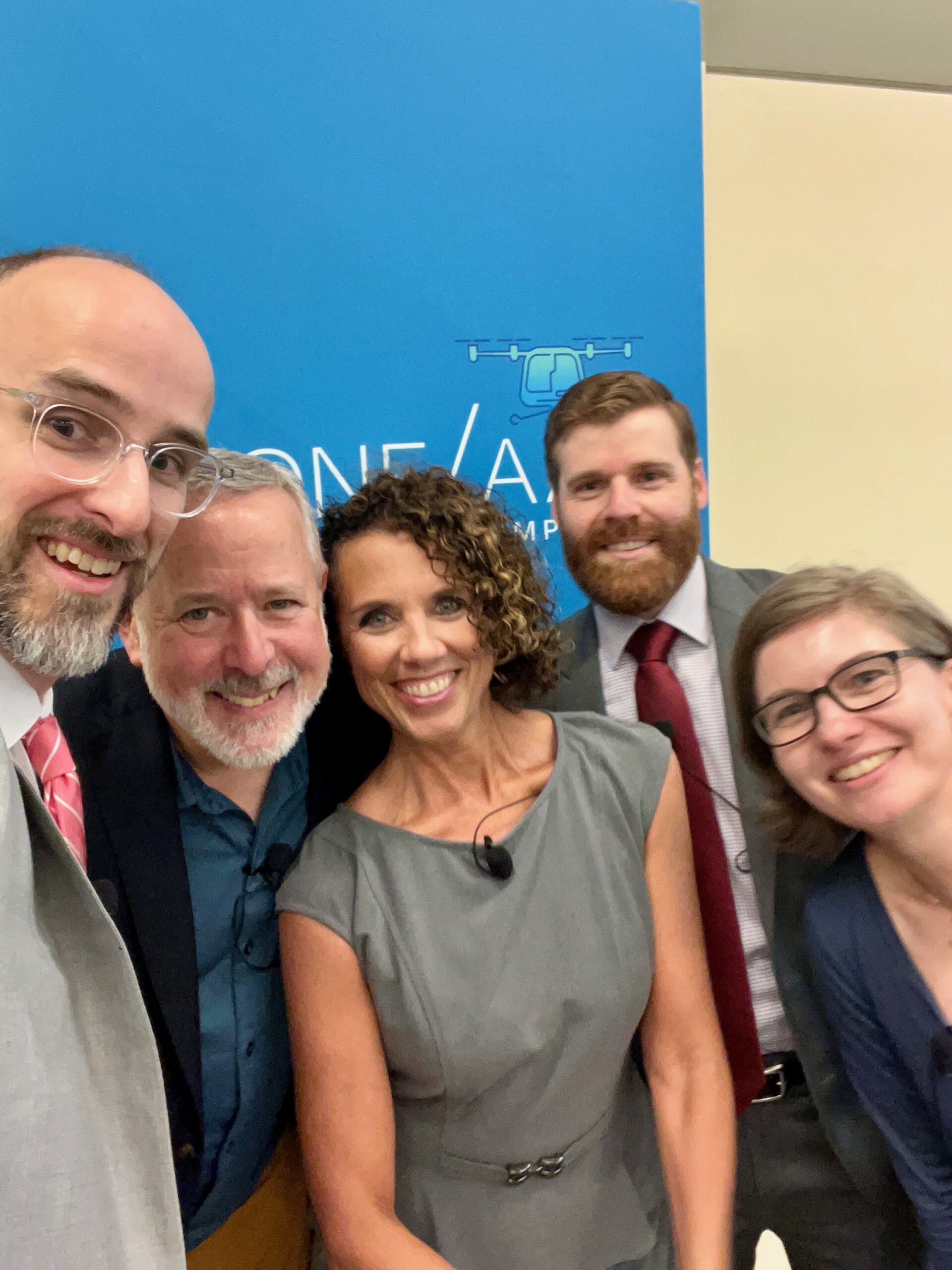Reflections on the FAA Drone & AAM Symposium
DRONELIFE is honored to post this Op-Ed by industry thought leader Dawn Zoldi on the conversations and results from the recent FAA Drone and AAM Symposium, sponsored by the FAA and AUVSI. If you missed attending, read on for an inside view of the key messages delivered and the buzz on the floor.
By DRONELIFE Contributor Dawn Zoldi (Colonel USAF, Ret.)


Last week, the uncrewed aircraft systems (UAS) and Advanced Air Mobility (AAM) industries gathered in Baltimore, Maryland for the Federal Aviation Administration (FAA)’s 8th Drone and AAM Symposium. If the agency sticks to the milestones and timelines that panel after panel outlined, expect 2025 to be a banner year. Here are my thoughts on some of the key points we heard.
BVLOS Rulemaking | Part 108 – The FAA plans to provide a draft rule either by the end of this year or at the beginning of next year. (Note at last year’s Symposium, the FAA had targeted this August to drop that rule.) Despite the fact that historically the FAA has pushed out rules during the Christmas holiday (think: Remote ID), I’m betting on a post-Jan 6th launch. Also, in light of AUVSI President Michael Robbins’ keynote comment to the effect of “Let’s not let perfect be the enemy of the good,” I’m also thinking that, like Remote ID, the final BVLOS rule may look different from the draft. Let’s just hope there’s no lawsuit to hold it up further…
Section 2209 – This rule, focused on protecting critical infrastructure (CI), which Congress mandated back in 2016, re-up’d in 2018, and re-emphasized in this past Reauth, will reportedly launch in conjunction with the BVLOS rule. It is unclear if it will be part of Part 108 or stand-alone with a simultaneous push (similar to how Ops Over People and At Night launched with Remote ID). Given Congress’ lack of forward movement on what I’ll call “related” counter-UAS legislation (related only because several bills would have given critical infrastructure owner/operators detection authority), this rule may be hyper-limited. And remember, 2209 purports to merely create a “bubble” around CI. It does not bestow authority for CI owners/operators to track, or mitigate, anything that might pierce that bubble. As such, even when this rule finally goes live, without additional authorities, in my opinion, it will remain a yin without its yang unless Congress takes further action.
UAS Traffic Management (UTM) – UTM seems to be alive and well, at least at the “key site” in the Dallas Fort-Worth (DFW) area – and especially after the recent announcement of the FAA’s approval of both Wing and Zipline to perform strategic deconfliction. What many may not realize is that this process took several years. Now, one full year after the FAA announced the Near-Term Approval Process (NTAP) for UTM that these companies leveraged for these approvals, we have a total of 3 such approvals granted (the FAA first approved Vantis, in North Dakota, under NTAP, to perform UTM). Considering some other timelines (e.g., several years for certs), this is still relatively fast. We hope to see more of these approvals soon. Speaking of “seeing,” despite the fact that the FAA’s UTM webpage contains great information, no page exists yet to post those NTAP approvals. In furtherance of transparency, and supporting the industry with relevant information to succeed, we also hope to see this pop up soon (akin to the Part 107 waivers page).


Remote ID (RID) – Full transparency, I missed the session where folks reportedly almost came to fistacuffs over this topic, but did learn from DRONERESPONDERS that only about 25 percent of UAS users are RID compliant. What?! Will the push for network RID in the latest Reauth matter? Not sure. But this safety and security gap, especially when coupled with a lack of C-UAS authorities for those who need it to protect us, should make us all go “hmmmm….”
AAM – We heard a lot about AAM and related milestones, from finalizing the much-anticipated powered lift Special Vertical and Runway (SVAR) regulations (this fall) to certifying the first eVTOL aircraft (end 2025) to full operating capacity by the Olympics in Los Angeles (2028). These promises are tempered, for many of us, with a healthy dose of skepticism as we watched the Paris Olympics over-promise | under-deliver on similar “air taxis” flights. Even so, an Interagency Working Group intends to publish a National AAM Strategy in 2025 and the AAM OEMs showed up in relative “force” (including BETA technologies, Joby, Supernal, Ferrovial, Archer). There absolutely remains lots of buzz and excitement around AAM. Perhaps this industry will move further faster because, unlike small UAS, it is more directly linkable to traditional aviation (both general aviation and helicopters), including in terms of some of the infrastructure needed (think: heliports, helipads, helistops). On that note, it was also exciting to hear that, even while continued R&D occurs, the FAA plans to update its Vertiport Design document this year and to publish an Advisory Circular (AC) next year.
At the end of the day, all of these promises will need to be backed up with action. Both the drone and AAM industries need these laws, regulations and policies to thrive. We’ve seen positive forward movement recently. As AUVSI’s Robbins noted, “We’ve seen more progress in this past year than we have in several years prior.” We’re all banking on even more, continued progress. I’m not a betting type of person. But after attending last week’s Symposium, I’m putting my money on the FAA for the win.
Read more:

 Dawn M.K. Zoldi (Colonel, USAF, Retired) is a licensed attorney with 28 years of combined active duty military and federal civil service to the U.S. Air Force. She is the CEO & Founder of P3 Tech Consulting and an internationally recognized expert on uncrewed aircraft system law and policy. Zoldi contributes to several magazines and hosts popular tech podcasts. Zoldi is also an Adjunct Professor for two universities, at the undergraduate and graduate levels. In 2022, she received the Airwards People’s Choice Industry Impactor Award, was recognized as one of the Top Women to Follow on LinkedIn and listed in the eVTOL Insights 2022 PowerBook. For more information, follow her on social media and visit her website at: https://www.
Dawn M.K. Zoldi (Colonel, USAF, Retired) is a licensed attorney with 28 years of combined active duty military and federal civil service to the U.S. Air Force. She is the CEO & Founder of P3 Tech Consulting and an internationally recognized expert on uncrewed aircraft system law and policy. Zoldi contributes to several magazines and hosts popular tech podcasts. Zoldi is also an Adjunct Professor for two universities, at the undergraduate and graduate levels. In 2022, she received the Airwards People’s Choice Industry Impactor Award, was recognized as one of the Top Women to Follow on LinkedIn and listed in the eVTOL Insights 2022 PowerBook. For more information, follow her on social media and visit her website at: https://www.
Miriam McNabb is the Editor-in-Chief of DRONELIFE and CEO of JobForDrones, a professional drone services marketplace, and a fascinated observer of the emerging drone industry and the regulatory environment for drones. Miriam has penned over 3,000 articles focused on the commercial drone space and is an international speaker and recognized figure in the industry. Miriam has a degree from the University of Chicago and over 20 years of experience in high tech sales and marketing for new technologies.
For drone industry consulting or writing, Email Miriam.
TWITTER:@spaldingbarker
Subscribe to DroneLife here.


